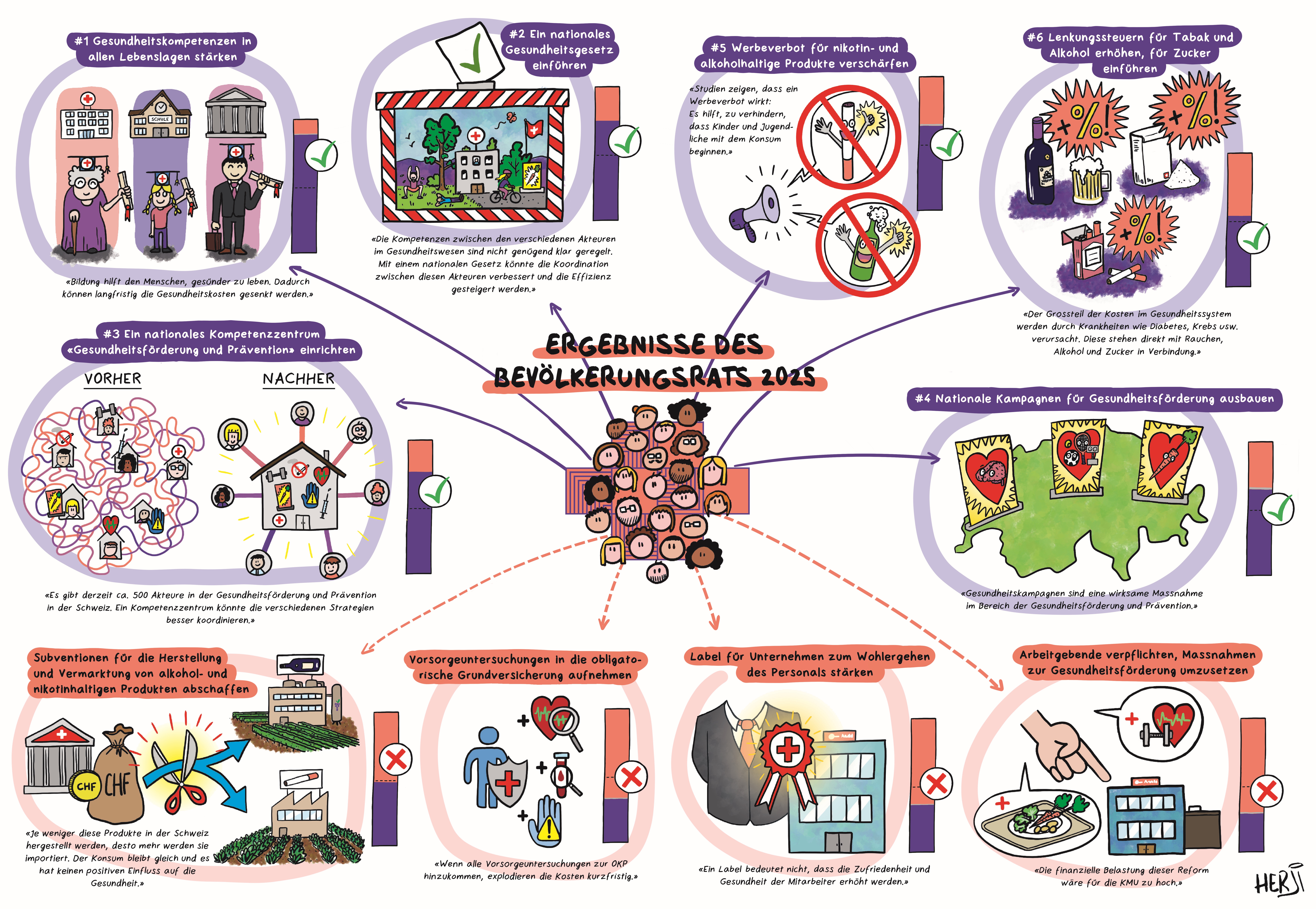Information on the topic of health promotion and prevention
The following information is, according to the Citizens’ Assembly 2025, important in order to discuss the topic of “Health Promotion and Prevention”:
Systemic challenges in the healthcare system
- The current healthcare system is focused on the reactive treatment of diseases and too little on the proactive preservation and promotion of health.
- Health promotion and prevention in Switzerland are strongly organised in a federal way, which leads to inequalities in implementation between the cantons. Coordination between different actors in the healthcare system is also inadequate.
- At the national level, there is no legal basis for addressing and promoting health promotion and prevention in a coordinated manner.
- The implementation of many prevention measures fails due to political resistance. Lobby interests often prevent a consistent prevention policy, since health and illness are also a market in which a great deal of money is earned. The same applies to health-damaging products.
- The Swiss healthcare system is based on the principle of triple solidarity: between young and old, healthy and sick, and between rich and poor.
Prevention & health promotion in Switzerland
- Health promotion and prevention are not the same. Health promotion improves living conditions so that people remain healthy, for example clean air, clean water, green spaces, physical activity or healthy nutrition in everyday life. Prevention, on the other hand, specifically prevents diseases, for example through vaccinations or medical check-ups. Both approaches complement each other but have different focuses.
- Health promotion and prevention already start in childhood. The earlier health awareness is encouraged, the more likely long-term positive effects will be achieved.
- It is cheaper to prevent diseases than to treat them. More investment in effective prevention measures can reduce healthcare expenditure in the long term.
- Regular medical check-ups are important in order to detect diseases early and to avoid severe cases.
- There is scientific evidence on which measures are effective and cost-effective in preventing non-communicable diseases, see e.g. the “Best Buys” of the World Health Organization (WHO).
- Personal responsibility is important. However, health does not depend only on the individual, it is also a social responsibility. It is not enough to appeal only to individuals – measures are also needed to make the environment health-friendly.
- With the foundation Health Promotion Switzerland, there is a national institution that initiates, coordinates and evaluates projects for health promotion.
- There is the National Strategy for the Prevention of Non-Communicable Diseases. In addition, there are already many good prevention programmes and measures, but they are implemented with varying quality across regions and are not sufficiently coordinated with each other.
- The cooperation between conventional medicine and alternative approaches can help to better preserve health. If doctors increasingly include naturopathy and alternative medicine, more possibilities for holistic treatment arise.
Costs & financing of health promotion and prevention
- Around 80% of healthcare costs in Switzerland are caused by non-communicable diseases – such as cancer, diabetes and cardiovascular diseases. With a healthy lifestyle, around half of these non-communicable diseases could be prevented or delayed.
- In 2022, a total of CHF 92.9 billion was spent on healthcare. The highest costs were caused by treatment and care in doctors’ practices, hospitals and nursing homes (around 65%). In addition, demographic change (an ageing population) is leading to further increases in expenditure for chronic diseases and long-term care.
- Households bear the largest share of healthcare expenditure (around 60%). The Confederation, cantons and municipalities finance around 32% of the costs. Companies and other funding sources contribute around 8% of healthcare expenditure.
- Only a small share of total healthcare expenditure is spent on health promotion and prevention. Between 2016 and 2019, the share of expenditure on health promotion and prevention was around 1.7%. In 2022, expenditure rose to around 4.2% of total healthcare costs due to vaccination and testing campaigns during the Covid-19 pandemic.
- In 2022, 61% of prevention expenditure was related to Covid-19 and went to services for the prevention of communicable diseases (between 2016 and 2019, this share was significantly lower, at 7 to 11%). Around 20% was used in 2022 for education and raising awareness among the population. Around 18% of prevention expenditure was distributed across prevention measures in the areas of addiction, mental health, accidents & injuries, and physical activity & nutrition.
- The costs caused by communicable diseases are comparatively low. Among other reasons, this is because the associated prevention measures are effective.
- Services for health promotion and prevention are financed from various sources (including the alcohol tenth, the Tobacco Prevention Fund, and Health Promotion Switzerland). The fragmented financing structure makes it difficult to use the available resources efficiently and to exploit synergies.
Health literacy of the Swiss resident population
- Many people do not know exactly how the Swiss healthcare system works. Almost half of the Swiss population has difficulties dealing with health information and finding their way around the healthcare system.
- Health literacy is the basis for people to be able to make good decisions for their health. There is already a lot of health information and services, but they are often not well known or are difficult to understand. Disadvantaged population groups in particular are less well reached. In order for more people to strengthen their health literacy, information must be understandable, accessible and better communicated.
- Health education is a simple and inexpensive way to raise people’s awareness of their health and provide them with important knowledge. It ensures that everyone – regardless of their social or financial situation – receives the same information and can therefore take better care of their health.
- Everyone can contribute to their own health through small changes in lifestyle. These include, among other things, plenty of physical activity, healthy nutrition, sufficient sleep and good social contacts. With a healthy lifestyle, a large proportion of non-communicable diseases could be prevented or delayed.
